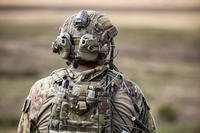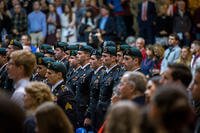In December 1908, all the flags in the Commonwealth of Massachusetts were lowered to half-mast in tribute to Sgt. William H. Carney, who had died on Dec. 8. Never before had this honor been paid to an ordinary citizen and African American; but Carney was far from ordinary.
Carney was born into slavery in 1840. When he was a teenager, his father escaped to the north via the Underground Railroad and purchased his family out of bondage, bringing them to New Bedford, Mass. Carney never took freedom for granted. On Feb. 17, 1863, soon after the Union Army called for African-American volunteers, Carney enlisted in the Morgan Guards, which became part of the 54th Regiment, Massachusetts Volunteer Infantry. He told the Liberator newspaper why: "Previous to the formation of colored troops, I had a strong inclination to prepare myself for the ministry; but when the country called for all persons, I could best serve my God serving my country and my oppressed brothers."
Carney and 46 other African-American volunteers from New Bedford were assigned to Company C of the 54th, and their performance in battle would soon silence those who predicted "the Negro would not fight." At the famed Battle of Fort Wagner, S.C., on July 18, 1863, under command of Col. Robert Gould Shaw, the 54th fought hard, long, and brave. The siege at Fort Wagner was one of the war's bloodiest, and 1,500 African-American troops died in their country's service. Col. Shaw, who had led his troops into battle, was shot down just as he reached the summit.
Carney himself was wounded in head, leg, and hip and lying in agony near the fallen Shaw when he saw the soldier bearing the American flag falter. Gathering his strength, Carney seized the colors: "In less than 20 minutes I found myself alone struggling upon the ramparts, while the dead and wounded were all around me ... I knew my position was a critical one, and I began to watch to see if I would be left alone." Confronted by a battalion of enemies, Carney wound the flag around its staff and held it aloft while running through a volley of Confederate grapeshot.
When he reached friendly lines, Carney refused to surrender the flag to anyone save a member of his own regiment. Handing it over as his comrades cheered, Carney cried, "Boys, the old flag never touched the ground!" and fell to the ground in a dead faint. His selfless heroics earned Carney the first Medal of Honor given to an African American. The "old flag" he bore hangs in Boston's Memorial Hall, not far from August Saint-Gaudens's bronze mural honoring the 54th. Behind the mounted figure of Shaw is the face of William H. Carney — African American, soldier, and U.S. citizen.
Related links:















